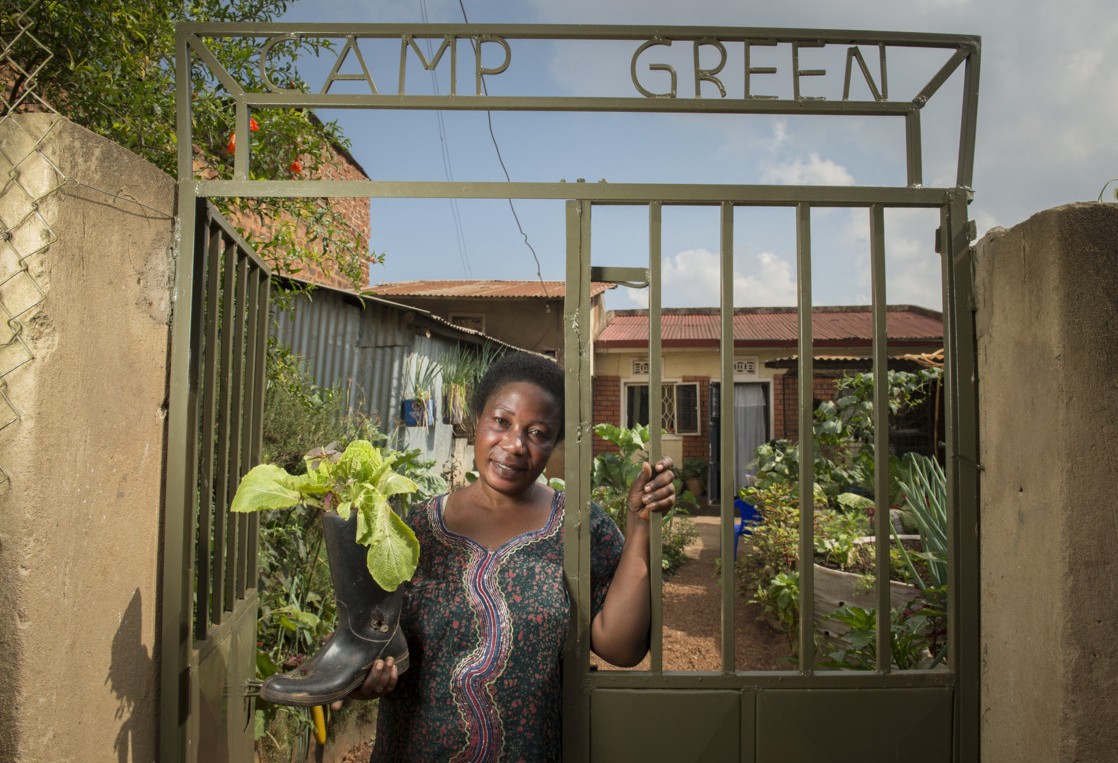Reflections on advancing development strategies that include small-scale farmers
 Harriet Nakabaale's is changing the landscape of urban agriculture in Kampala and her mission is to share the vast knowledge she has accumulated with her community. You can read more about Camp Green here: http://bit.ly/1z0H6ek Photo: Ami Vitale / Oxfam America
Harriet Nakabaale's is changing the landscape of urban agriculture in Kampala and her mission is to share the vast knowledge she has accumulated with her community. You can read more about Camp Green here: http://bit.ly/1z0H6ek Photo: Ami Vitale / Oxfam America
A reminder that food security research must reach the poor farmers it is intended to support.
This post originally appeared on the Norman E. Borlaug Leadership Enhancement in Agriculture Program (Borlaug LEAP) blog.
Emmanuel Tumusiime is a researcher on economic justice and agriculture at Oxfam America.
“You have to be so creative, not all knowledge can be acquired from school. I want to spread this spirit to other people, so they believe that any activity, however small it is, can generate income, so they are able to support their families.”
— Harriet Nakabaale, Urban farmer and founder of Camp Green, a backyard enterprise that mixes intensive gardening with community education on urban agricultural practices, in Kampala, Uganda
After decades of agricultural development interventions, agricultural productivity is still low—particularly in sub Saharan Africa—restricting millions within awful poverty and hunger remaining as a serious challenge. Clearly our understanding of how to bring about development, particularly in agriculture, is still imperfect; perfecting it is a crucial step in eradicating extreme poverty.
Policy analysts and practitioners continue to invest time and energy in search of transformative solutions. As climate change complicates the situation further, new and difficult questions are emerging. Are broader production gains in agriculture benefiting the smallest, poorest farmers? Can they?
There is a backdrop of development trends in small scale agriculture showing that a large majority of small farmers are sitting on the sidelines of agriculture development. If we care about ensuring inclusive growth, this means to me that we need to reexamine current dominant development paradigms in agriculture, notably market-led, value chain, and or private sector-led agricultural growth strategies.
The good news for millions of small-scale farmers and the development community in general is that there is still a political and economic recognition that small-scale agriculture matters to achieving development. In fact, public and private sector investments in agriculture picked up in the wake of the 2008 global food price spike.
But how is policy and practice changing to meet the needs of small-scale farmers? Analysis, for instance from Tufts University, is showing that little has changed; still too much is focused on producing more food, and increasingly, on easing the rules for private investors to attract their capital and technology into agriculture. My research at Oxfam shows that donors and governments are increasingly promoting private large-scale farms as a compliment, if not alternative, to small scale led-agricultural growth. The strategy is reasonable in some sense. Increasing food production should make food more available. More private capital and agricultural technologies can create more spaces for small farmers to learn, and perhaps market their produce.
But producing more food per se cannot be the solution to sustainable food security and or reducing poverty, especially if productivity gains are not occurring in the bottom small farmers (among whom yield gaps are largest), nor if producing more food is not associated with increased access to food among the poorer populations where hunger is most prevalent. Our research (paper forthcoming – “Lookout in this Space”) dives deeper in these issues.
One crucial forthcoming observation is that policy ineffectiveness is often the result of communication failure among policy makers, policy analysts, practitioners, and more importantly, with small-scale farmers. Getting this right has implications in our professional lives, and in how we learn and adapt. My research work at Oxfam revolves around elevating farmers’ voices, and developing our perspectives about how and which agriculture interventions can effectively bring about a sustainable, inclusive agricultural system.
Harriet Nakabaale has managed to turn a 50-feet-by-32-feet chunk of hard urban ground in Kampala into an oasis of greens. Experiences of women like Nakabaale remind us that improving agriculture or food security is foremost about empowering farmers to have more choices, better information, and more voice in the decisions that affect them. Conducting research that has ‘meaning,’ that is useful in impacting policy and practice about real issues affecting farmers like her, as well as rural communities and their agricultural livelihoods, is a crucial part of this.
It’s fulfilling to me to be a part of this discourse. Well, thanks too to the Borlaug LEAP fellowship that helped form and support my research interests in agricultural development.